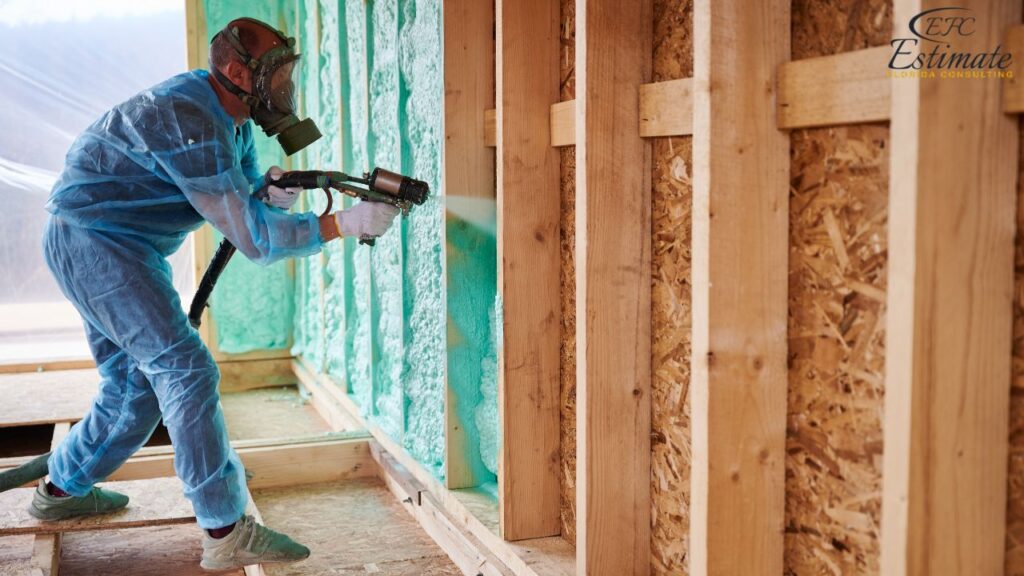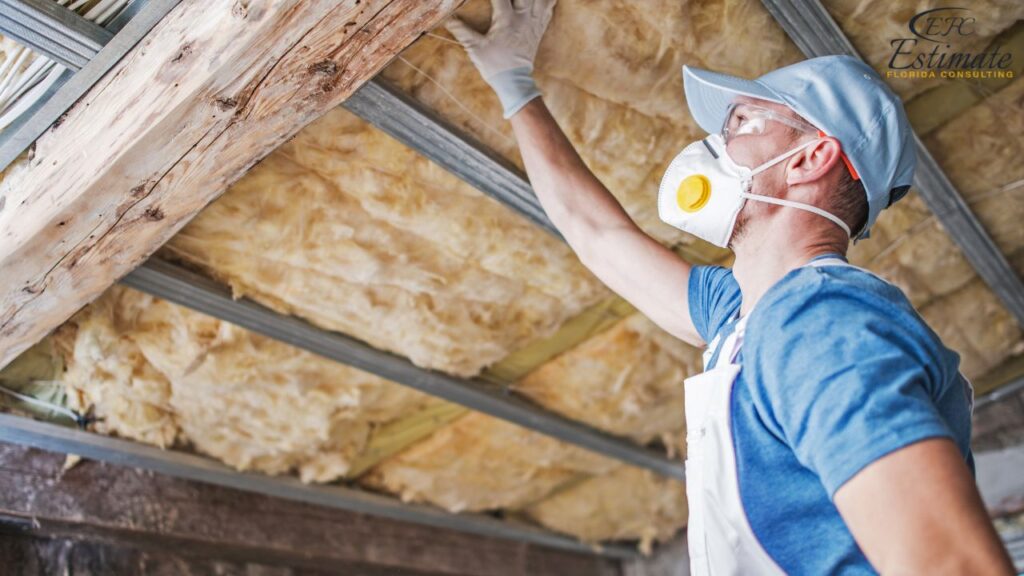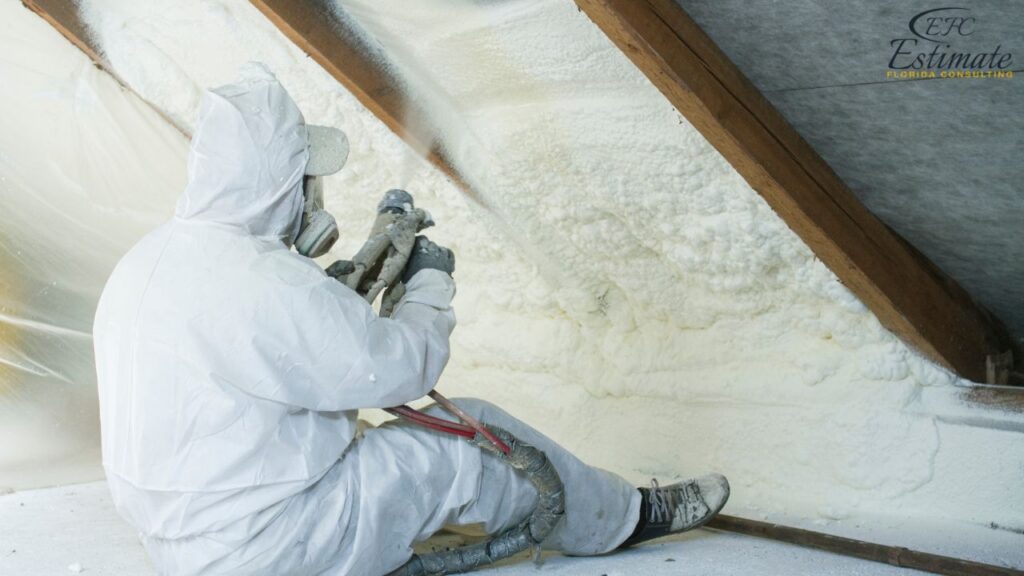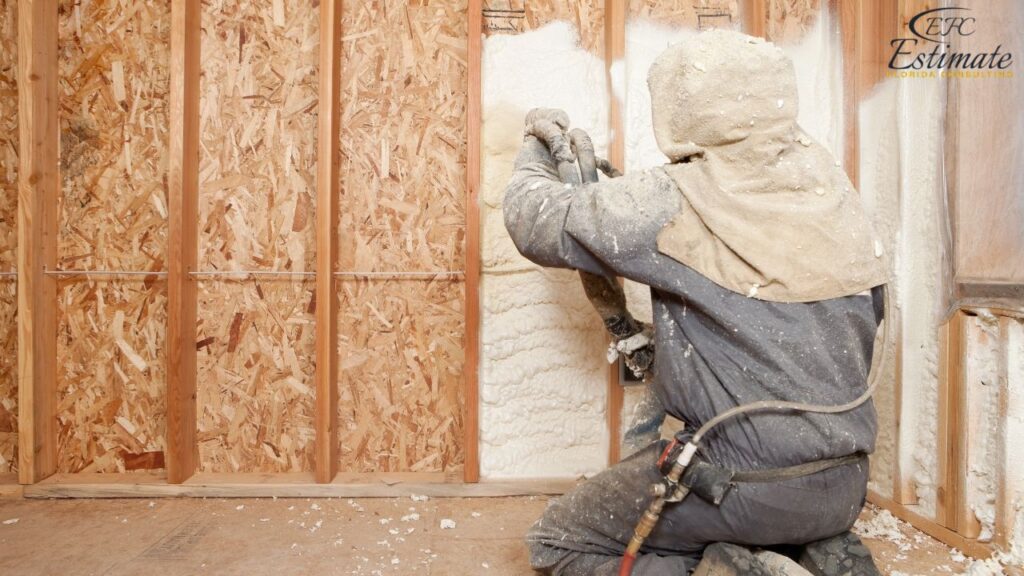How Much Does it Cost to Insulate a 1,600 sq ft House?
The average cost to insulate a 1,600 square foot house typically ranges from $7,280 to $24,024, including materials and labor. This translates to approximately $4.55 to $15.00 per square foot. The total cost is influenced by the type of insulation selected, the complexity of the installation process, and any additional work that may be required. Each insulation material has different thermal properties and installation requirements, which can impact both the initial costs and long-term savings on energy bills. Understanding these costs can help homeowners budget effectively and choose the most suitable insulation option for their specific needs.

Insulation Type | Cost per Square Foot | Total Cost Range |
Batt Insulation | $4.55 – $7.70 | $7,280 – $12,320 |
Blown-In Insulation | $4.55 – $12.25 | $7,280 – $19,600 |
Spray Foam Insulation | $9.10 – $15.00 | $14,560 – $24,024 |
Factors Influencing Insulation Costs
Several factors influence the overall cost of insulating a house, each contributing to the final expense in unique ways. Understanding these factors can help homeowners budget accurately and make informed decisions about their insulation project.
Type of Insulation
The type of insulation chosen significantly affects the overall cost. Batt insulation is usually the least expensive option, while spray foam insulation tends to be the most costly due to its superior insulating properties and air-sealing capabilities. Each type of insulation also has different R-values, which measure thermal resistance. Higher R-values indicate better insulation performance, but they often come with higher price tags. When selecting insulation, homeowners should consider their local climate, the existing insulation (if any), and their budget to ensure they achieve optimal performance and energy efficiency.
Labor Costs
Labor costs can vary based on the region, the complexity of the installation, and the contractor’s experience. On average, labor costs can account for 50% to 70% of the total insulation cost. While hiring experienced contractors may come at a premium, their expertise can ensure that the insulation is installed correctly, maximizing its effectiveness. Homeowners should obtain quotes from multiple contractors to compare pricing and services. Additionally, scheduling the insulation project during off-peak seasons can sometimes lead to lower labor rates, further reducing overall costs.
Labor Type | Cost per Square Foot | Total Labor Cost Range |
Basic Labor | $2.25 – $4.55 | $3,600 – $7,280 |
Skilled Labor | $4.55 – $7.70 | $7,280 – $12,320 |
Specialist Labor | $7.70 – $12.25 | $12,320 – $19,600 |
Existing Insulation Removal
If your house already has old or damaged insulation that needs to be removed before new insulation can be installed, this will add to the overall cost. Removal costs can range from $4.55 to $6.40 per square foot, depending on the type and condition of the existing insulation. Proper removal of old insulation is crucial to ensure that the new insulation performs optimally, as any residual materials can impede installation and reduce efficiency. Additionally, removing old insulation can help identify and address any underlying issues such as mold or pest infestations, ensuring a healthier living environment.

Removal Task | Cost per Square Foot | Total Removal Cost Range |
Basic Removal | $4.55 | $7,280 |
Complex Removal | $6.40 | $10,240 |
Accessibility of the House
The accessibility of your house can also impact the cost of insulation. If the areas to be insulated are difficult to reach or have limited headroom, the installation may take longer and require additional labor, increasing overall costs. Inaccessible areas may also necessitate special equipment or modifications, further adding to the expense. Ensuring easy access to the spaces being insulated can help streamline the installation process and minimize labor costs. Additionally, improving access can facilitate future maintenance and inspections, ensuring that the insulation remains effective over time.
Types of Insulation
Choosing the right type of insulation for your house is crucial for achieving optimal energy efficiency and comfort. Each type of insulation has its own advantages and disadvantages, making it essential to consider factors such as cost, effectiveness, and installation requirements.
Batt Insulation
Batt insulation, made from fiberglass or mineral wool, is one of the most common and cost-effective options for insulating a house. It comes in pre-cut panels that fit between wall studs, ceiling joists, and floor joists. While batt insulation is easy to install, it must be fitted correctly to avoid gaps that can reduce its effectiveness. This type of insulation is ideal for standard wall cavities and attics with straightforward layouts. Additionally, fiberglass batts are non-combustible and resistant to moisture, contributing to improved fire safety and durability.

Batt Insulation Costs | Cost per Square Foot | Total Cost for 1,600 Sq Ft |
Standard Fiberglass | $4.55 – $7.70 | $7,280 – $12,320 |
Blown-In Insulation
Blown-in insulation, made from cellulose, fiberglass, or mineral wool, is applied using a blowing machine. It provides excellent coverage by filling gaps and hard-to-reach areas that batt insulation may miss. This type of insulation is effective for adding insulation over existing layers and is particularly useful for attics with irregular shapes or obstacles. Blown-in insulation has good thermal and soundproofing properties, enhancing both energy efficiency and indoor comfort. However, it may settle over time, potentially reducing its effectiveness, so periodic inspections might be necessary to ensure optimal performance.
Blown-In Insulation Costs | Cost per Square Foot | Total Cost for 1,600 Sq Ft |
Cellulose | $4.55 – $12.25 | $7,280 – $19,600 |
Fiberglass | $5.45 – $12.75 | $8,720 – $20,400 |
Download Template For Insulation Project Breakdown
- Materials list updated to the zip code
- Fast delivery
- Data base of general contractors and sub-contractors
- Local estimators

Spray Foam Insulation
Spray foam insulation is the most expensive option but offers the best performance in terms of thermal resistance and air sealing. It expands upon application, filling gaps and creating an airtight seal that prevents air leaks and moisture infiltration. Spray foam is ideal for homes that require superior insulation and moisture control. While the initial investment is higher, the long-term benefits, such as lower energy bills and improved indoor air quality, often make it a worthwhile investment. Furthermore, spray foam insulation is durable and has a long lifespan, contributing to overall energy savings.
Spray Foam Insulation Costs | Cost per Square Foot | Total Cost for 1,600 Sq Ft |
Closed Cell Foam | $9.10 – $15.00 | $14,560 – $24,024 |
Benefits of Insulating Your Home
Insulating your home offers numerous benefits that go beyond just temperature control. Proper insulation enhances energy efficiency, comfort, and overall property value, making it a wise investment for homeowners.
Energy Efficiency
Properly insulating your home can significantly reduce energy consumption and lower utility bills. By preventing heat loss in the winter and heat gain in the summer, insulation helps maintain a consistent indoor temperature, reducing the reliance on heating and cooling systems. This can lead to substantial savings on energy bills over time, making insulation a financially smart choice. Moreover, energy-efficient homes often qualify for rebates and incentives, further offsetting the initial insulation costs.
Cost Savings
While the upfront cost of insulation may be significant, the long-term savings on energy bills can quickly offset this expense. Homeowners can expect to save between 10% and 50% on their energy bills, depending on factors such as climate and existing insulation. These savings can accumulate over the years, making insulation a cost-effective investment. Additionally, some insulation projects may qualify for rebates or tax credits, further reducing the overall cost. Insulating your home can also increase its resale value by enhancing its energy efficiency and comfort, making it more appealing to potential buyers.
Enhanced Comfort
Insulating your home enhances indoor comfort by maintaining a more consistent temperature throughout the year. It helps prevent drafts and cold spots during the winter months and keeps your home cooler in the summer. This improvement in comfort can also contribute to better overall health and well-being. Furthermore, proper insulation can reduce noise pollution, creating a quieter and more peaceful living environment. Additionally, insulation helps regulate indoor humidity levels, preventing issues such as condensation and mold growth, which can affect both comfort and health.
Environmental Impact
By reducing energy consumption, home insulation contributes to a lower carbon footprint. It helps decrease the demand for energy production, which can lead to reduced greenhouse gas emissions and other environmental impacts. This makes insulation not only a financially smart choice but also an environmentally responsible one. Investing in energy-efficient insulation can be a crucial step in supporting sustainability and combating climate change. Additionally, choosing environmentally friendly insulation materials can further minimize your home’s environmental impact, promoting a more sustainable living space.
Additional Costs to Consider
In addition to the basic insulation costs, there are other potential expenses that homeowners should be aware of. These additional costs can impact the overall budget and should be factored into the planning process to avoid unexpected expenses.
Ventilation
Proper ventilation is crucial when insulating a house to prevent moisture buildup and ensure proper airflow. Installing or upgrading ventilation systems can add to the overall cost, but it is essential for maintaining a healthy indoor environment. Poor ventilation can lead to moisture problems, reducing the effectiveness of the insulation and potentially causing damage to the home. Ensuring adequate ventilation can extend the lifespan of the insulation and prevent issues such as mold growth and wood rot.

Ventilation Costs | Cost per Unit | Total Cost Range |
Basic Ventilation System | $910 – $2,184 | $910 – $2,184 |
Advanced Ventilation System | $2,184 – $4,550 | $2,184 – $4,550 |
Moisture Barriers
In areas with high humidity, installing moisture barriers can prevent condensation and mold growth. This additional step can increase the overall cost of insulation but is crucial for maintaining a healthy indoor environment. The cost of moisture barrier materials varies based on the type and size of the area being covered.
Moisture Barrier Costs | Cost per Square Foot | Total Cost for 1,600 Sq Ft |
Basic Vapor Barrier | $0.91 – $1.82 | $1,456 – $2,912 |
High-Performance Barrier | $1.82 – $2.73 | $2,912 – $4,368 |
Get 5 New Leads Next 7 Days With Our System
- Multi-Family House
- Single-Faimly House
- Modern House
- Duplex
- Ranch House
- Bungalow
Conclusion
Insulating a 1,600 square foot house is an investment that pays off in terms of energy efficiency, comfort, and long-term savings. Understanding the costs involved, including materials, labor, and any additional considerations, can help homeowners make informed decisions and choose the right insulation options for their specific needs. By prioritizing insulation, homeowners can enhance their living environment while reducing their overall energy costs and environmental impact.
FAQs
The average cost to insulate a 1,600 square foot house typically ranges from $7,280 to $24,024, including materials and labor. This translates to approximately $4.55 to $15.00 per square foot. The total cost depends on the type of insulation selected, the complexity of the installation process, and any additional work required.
Here’s a breakdown of the most common types of insulation and their costs:
Insulation Type | Cost per Square Foot | Total Cost Range |
Batt Insulation | $4.55 – $7.70 | $7,280 – $12,320 |
Blown-In Insulation | $4.55 – $12.25 | $7,280 – $19,600 |
Spray Foam Insulation | $9.10 – $15.00 | $14,560 – $24,024 |
Several factors can impact the overall cost of insulating a house:
- Type of Insulation: Different types have varying costs and thermal properties. Batt insulation is usually the least expensive, while spray foam is the most costly but offers superior performance.
- Labor Costs: Labor costs can account for 50% to 70% of the total insulation cost, varying based on region and contractor experience.
- Existing Insulation Removal: Removing old insulation can add costs, ranging from $4.55 to $6.40 per square foot.
- Accessibility of the House: Difficult-to-reach areas may require more labor, increasing overall costs.
Labor costs vary based on the type of labor required:
Labor Type | Cost per Square Foot | Total Labor Cost Range |
Basic Labor | $2.25 – $4.55 | $3,600 – $7,280 |
Skilled Labor | $4.55 – $7.70 | $7,280 – $12,320 |
Specialist Labor | $7.70 – $12.25 | $12,320 – $19,600 |
Insulating your home offers numerous advantages, including:
- Energy Efficiency: Reduces energy consumption and lowers utility bills by maintaining consistent indoor temperatures.
- Cost Savings: Homeowners can save between 10% and 50% on energy bills, offsetting the upfront insulation costs over time.
- Enhanced Comfort: Prevents drafts and cold spots, improving indoor comfort and health.
- Environmental Impact: Reduces your carbon footprint and supports sustainability efforts.
Additional costs that may arise during the insulation process include:
- Ventilation: Proper ventilation systems are essential for maintaining a healthy indoor environment. Basic systems range from $910 to $2,184 and advanced systems from $2,184 to $4,550.
- Moisture Barriers: In humid areas, moisture barriers prevent condensation and mold growth, costing between $0.91 and $2.73 per square foot.
Google Reviews



Process To Get Insulation Cost Estimate Report
Here I am going to share some steps to get insulation cost estimate report.
-
You need to send your plan to us.
You can send us your plan on info@estimatorflorida.com
-
You receive a quote for your project.
Before starting your project, we send you a quote for your service. That quote will have detailed information about your project. Here you will get information about the size, difficulty, complexity and bid date when determining pricing.
-
Get Estimate Report
Our team will takeoff and estimate your project. When we deliver you’ll receive a PDF and an Excel file of your estimate. We can also offer construction lead generation services for the jobs you’d like to pursue further.

